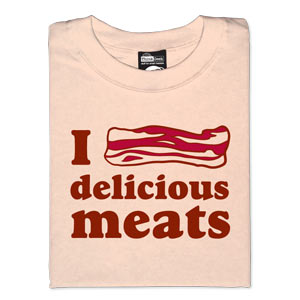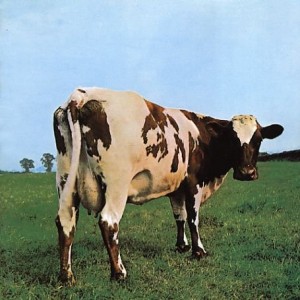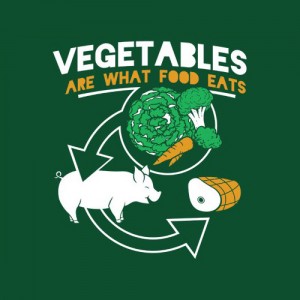
A few days ago, the USDA (the U.S. Department of Agriculture), responsible for executing the federal government’s policies on food and agriculture regulation, released an internal memo describing various measures wherein the USDA is trying to lead by example in representing the U.S.’ commitment to agricultural, environmental, and health-related priorities. The topic of this week’s memo was how the USDA can improve the environmental impact of its headquarters. One article encouraged employees at USDA headquarters to commit to a movement called “Meatless Mondays”; to choose not to consume meat one day a week.
Writes the USDA:
One simple way to reduce your environmental impact while dining at our cafeterias is to participate in the “Meatless Monday” initiative. This international effort, as the name implies, encourages people not to eat meat on Mondays. Meatless Monday is an initiative of The Monday Campaign Inc. in association with the John Hopkins School of Public Health.
How will going meatless one day of the week help the environment? The production of meat, especially beef (and dairy as well), has a large environmental impact. According to the U.N., animal agriculture is a major source of greenhouse gases and climate change. It also wastes resources. It takes 7,000 kg of grain to make 1,000 kg of beef. In addition, beef production requires a lot of water, fertilizer, fossil fuels, and pesticides. In addition there are many health concerns related to the excessive consumption of meat. While a vegetarian diet could have a beneficial impact on a person’s health and the environment, many people are not ready to make that commitment. Because Meatless Monday involves only one day a week, it is a small change that could produce big results.
Did you notice that our cafeterias have tasty meatless options? So you can really help yourself and the environment while having a good vegetarian meal!
Wikipedia has a nice article about the environmental impact of meat. In brief, cattle require on average about 7lbs of feed for every pound of meat produced, whereas pork requires about 3lbs of feed and chicken requires about 2lbs of feed. In addition, there is substantial amounts of water consumed in the raising of cattle, as well as the production of waste. Although cow manure is commonly recycled as fertilizer, methane gases produced by cattle contributes to ~14-18% of greenhouse gas emissions globally.

Red meat consumption (particularly overconsumption) is also associated with increased cardiovascular disease, hypertension, diabetes and cancer. Although red meat isn’t generically bad for you, the Meatless Monday initiative notes that Americans typically eat about 45% more red meat than is recommended (by the USDA!) to maintain a healthy diet.
Okay, so the USDA raises awareness about the Meatless Monday initiative in its newsletter. It encourages employees to think about their red meat consumption, and draws attention to its meatless alternatives in its cafeterias. In short, the USDA hasn’t instituted a Meatless Monday policy at its headquarters; it’s merely drawing attention to the negative environmental and health impacts of red meat to its employees. This is, incidentally, entirely consistent with the USDA’s mission.
This is the kind of thing that should totally have flown under the radar.
But, leave it to the Republicans to get all riled up. From the National Cattleman’s Beef Association to various Republican senators of beef-producing states, the Republicans are up in arms over the USDA’s three-paragraph discussion of vegetarianism. Reports ABC:
The association’s president, J.D. Alexander, said the newsletter called into question the USDA’s “commitment” to farmers and ranchers. He called the newsletter “awakening,” and condemned the agency for failing to understand efforts made to produce food sustainably. He cited progress the industry has made over the last 30 years to produce more meat with fewer environmental costs.
“This move by USDA should be condemned by anyone who believes agriculture is fundamental to sustaining life on this planet,” Alexander said.
Sen. Jerry Moran (R-Kansas) noticed, too. Once he saw Twitter responses to the USDA’s promotion of Meatless Mondays, he immediately printed out the USDA’s newsletter and headed down to the Senate floor, his aide, Garrette Silverman told ABCNews.com. Kansas is the third-largest beef producer in the country.
“We are a beef-producing state and it is one of the items that improves our balance of trade as we export meat and beef around the world,” Moran concluded his three-minute speech on the Senate floor. “And, yet, our own Department of Agriculture encourages people not to consume meat.”
A press release from Moran’s office called the newsletter “demonizing” to the meat industry and meat consumers. He said the letter “attacks” meat production and fails to acknowledge livestock’s role in the economy.
“Never in my life would I have expected USDA to be opposed to farmers and ranchers,” Sen. Moran said.
Senator Chuck Grassley of Iowa tweeted his own indignation over the Meatless Monday campaign. He vowed that he would personally eat enough meat on Mondays to compensate for the USDA’s recommendations about Meatless Monday.

Look, the science is irrefutable — the meat industry is environmentally taxing. But, what’s really galling is the GOP’s brazen refusal to allow science and facts to at least temper their response as they rise to the defense of the meat packing industry. What’s galling is the GOP’s conflation of meat consumption with base American patriotism: as if eating a T-bone steak will bring troops back from Iraq (while choosing soy milk in your coffee puts you in league with the terrorists). Rather than to acknowledge the simple truth that cows and pigs and chicken and farm-raised fish are environmentally costly, and to introduce legislation that might both address this problem in a manner that could favour farmers and correct this environmental problem, Republicans instead fall-in-line behind a completely brainless, knee-jerk campaign of obvious pandering. They are rushing to the defense of an industry that makes about $52 billion dollars annually and yet still receives subsidies from the federal government.
This reaction — this reaction, right here — is what’s wrong with America and American politics today. It’s simply impossible to try and reach across the aisle and build bipartisan legislation with a party that can’t even tolerate a hint at criticizing an industry that provides millions of dollars to pad the coffers of the Republican party; and, particularly when those criticisms are backed by science. This is why the GOP is out of touch with what Americans both want and need. This is why the GOP are political bullies. This is why the GOP hates science. This is why the GOP will run this country into the ground if given half a chance.
Well, in response to the Republican histrionics and hand-wringing, James and I have come to a decision: we’re going to go meatless (on Mondays).

James and I already follow basic USDA guidelines for red meat consumption. It’s already not a huge component of our diet. We typically purchase lean beef when we buy it, and we prefer chicken or seafood. But, nonetheless, we’re going to try and cut out all meat on Mondays.
We confess, this could be tough. We’ve never tried to do anything that could be construed as “vegetarian”. Our decision to do this is fueled in small part by our recognition that the meat industry is indeed wasteful and is harming the environment. We also recognize the health benefits of reducing our red meat consumption: it will further help combat cardiovascular disease and cancer. Finally, this probably has a little something to do with the fact that we’re growing an organic vegetable garden on our patio that has resulted in a near-endless supply of salad.
But mostly, this is a reaction to the GOP reaction to the USDA, and the USDA’s subsequent retraction of its memo. This a “fuck you” to Republican stupid.

We don’t pretend that our decision will, alone, significantly impact meat production in this country. We know that two people vowing to not eat meat one day a week isn’t going to bankrupt any of Senator Grassley’s Iowan farm-working voters. And we’re not doing this because we think cows and pigs and chickens and fish are cute and cuddly and shouldn’t be eaten. We are not members of PETA; Tuesday through Sunday, cows and pigs and chicken and fish are still food.
But, hopefully two people vowing to not eat meat one day a week will encourage a few other people to look at what small changes they can make in their day-to-day lives to, well, live better lives. Because, in the end, the principle behind Meatless Mondays is a sound one: global change comes from a critical mass of everyday people making incremental — but permanent — lifestyle changes to better the world around us. And, I like that philosophy.
And finally, this is a challenge directly issued to the desk of Senator Grassley: put your money where your mouth is. If you really plan on eating more meat on Mondays to compensate for Meatless Mondays, than you can start with the meat that James and I won’t be eating.
So here’s the rules:
Every Monday, James and I will be going meatless. That means no beef, no pork, no chicken, no turkey and no fish (or other seafood-related meat products). We will be constructing entirely vegetarian dishes for our meals. We are permitting the use of animal products (milk, eggs, and cheese). And, at the risk of becoming a food blogger, I will post about our Meatless Monday adventures on this blog (at least as long as I can stand posting pictures of food).
If the USDA recommends that each adult eat 2-3 servings of meat a day, than James and I are collectively foregoing just over a pound of red meat every Monday. And that’s a pound more of meat that Senator Grassley’s going to have to eat to make up for us.

Anyone else with me? I’m curious to know exactly how much meat Chuck Grassley’s going to have to eat on Mondays from now on.
Act Now! More information on the Meatless Mondays campaign can be found here. And stay tuned for more on our Meatless Monday adventures.
